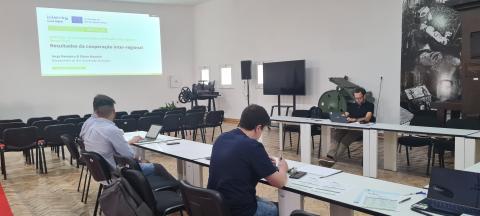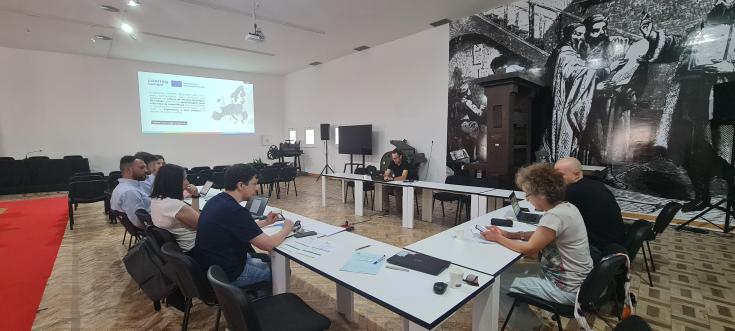3rd Regional Stakeholder Group Meeting at Centro Region
The 3rd Regional Stakeholder Group Meeting at Centro Region, Portugal, was held in Fundão on the 25th July, 2024 and the focus was the region's logistics challenges and pave the way for a greener future. Organized by the University of Aveiro and Fundão Municipality, the meeting was attended by 14 participants including representatives from the University of Aveiro, Municipality of Fundão, Xicos last mile delivery platform, Dr. João Gaspar from CIMBSE - Intermunicipal Community of Beiras and Serra da Estrela, Dr. Lídia Martins from Centro Regional Coordination and Development Commission, and Dr. Alcina Real, technical director of a local pharmacy.
The University of Aveiro presented SPOTLOG, highlighting the project's evolution and its focus on addressing urban and peri-urban logistics issues.
Participants stressed the unique challenges faced by rural regions, in the country side, such as increased environmental impact and the need for innovative solutions. B2C platforms like Xicos were recognized as crucial for revitalizing local commerce and accelerating deliveries in remote areas.
The discussion also focused on integrated territorial investments, with a particular focus on the Centre Region Operational Programme 2021-2027. The concept of a community delivery service was discussed and the experience within Fundão Municipality was shared and showed that it can be difficult to put into practice an efficient community delivery service, mostly due to the lack of notion of the potential business and social model behind it, which translated in challenges related to resource constraints and complex tender processes were identified. Aligned with many different challenges, there is also the lack of capacity in terms of Municipality of Fundão resources to face and move forward in specific needs related to the topic of the project SPOTLOG, and that is why it has been so important for the municipality to take part of all the exchange of experience shared within the partnership. Many solutions were learned and raise inspiration for potential transfer to the region.
It was debated that perhaps an innovative solution would be a logistics hub in which local operators would distribute last-mile deliveries in a sustainable and environmentally friendly way, encouraging partnerships with operators (as Xicos partnership with GLS for last-mile delivery), to avoid congestion, and the countless routes often performed with reduced parcel capacity, where collaboration between companies can be an ally in the transition to an innovative, collaborative and increasingly sustainable logistics. Additionally, it was highlighted the importance of minimising failed delivery attempts. Another question raised by Dr. Alcina revolved around how can we look at the best conditions for online deliveries but at the same time encourage traditional commerce? The discussion concluded that there is a need for strategic support for traditional commerce, with business models that encourage sustainability. Xicos representatives shared a solution they had learnt about at the previous SPOTLOG event in Romania, Constanta, in which there are ways of adapting existing movements, such as regular public transport, to combine them with components for distributing freight and parcels - Constanta's good practice consists of a minibus with a small part for freight, and which, on its route, is able to transport not only passengers but also parcels and packages destined for certain points or areas that are part of the bus's predefined route, so there are no extraordinary impacts, reducing the congestion of door-to-door deliveries.
A key takeaway from the meeting was the need for a balanced approach to online and traditional commerce, which has both economic and social effects. While online sales offer opportunities, it is essential to support local businesses through strategic measures and innovative business models. The idea of a centralised purchase hub to enhance local offerings and meet consumer expectations was also discussed.

The meeting's outcomes highlight the critical role of partnerships between academia, industry, and government in addressing logistics challenges and building a more sustainable future for the region:
● Need for sustainable logistics solutions in rural areas
● Importance of smart lockers and collection points
● Role of B2C platforms in revitalizing local commerce
● Challenges and opportunities for community delivery services
● Balancing online and traditional commerce
● Potential of innovative logistics hubs and delivery models
All the experiences reported raised an informative and empowering debate for the participants, making clear the need for specific plans to minimise impacts related to logistics and also to integrate them into urban definition plans. By working together, stakeholders can develop effective strategies to optimize logistics, reduce environmental impact, and enhance the region's economic vitality.
